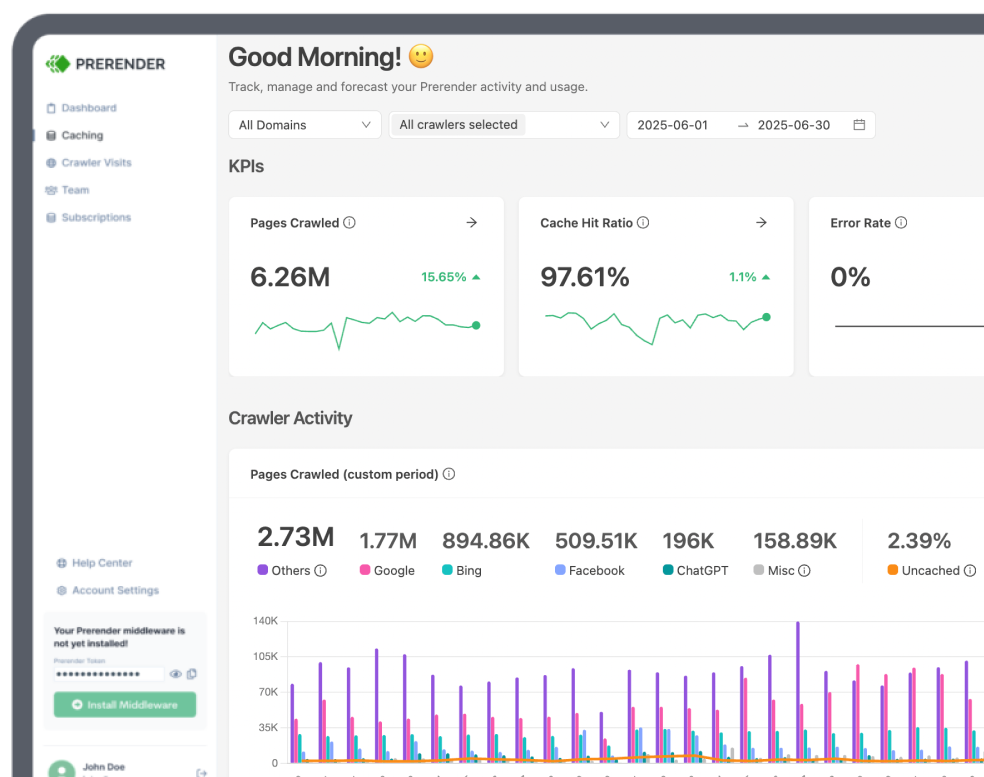Ecommerce businesses rely heavily on search visibility and traffic to drive online sales, so having robust SEO ranking tools focused on improving search rankings is critical for SERP dominance.
While Prerender helps JavaScript-heavy sites get indexed and ranked, there are other complementary tools ecommerce sites should leverage to boost their search visibility performance.
This article isn’t your average “one-size-fits-all” ecommerce SEO guide. We’ll uncover the best SERP ranking tools for each crucial aspect, from keyword research to on-page optimization, content marketing, and even local SEO mastery.
So, buckle up! Let’s discover the hidden weapons that will propel your products to the top of the SERP food chain and attract hungry shoppers ready to convert.
Google Search Console for Crawling Insights
The first tool on our list is Google Search Console (GSC). GSC is a free web service that helps you monitor, maintain, and troubleshoot your site’s presence in Google search results.
By connecting GSC with your website, you can see keyword rankings, top landing pages, links/images indexed, submitted sitemaps, and more. Additional info on page experience factors like mobile friendliness, page speed, and security is also available.
GSC reports also show which pages have been successfully indexed. This allows you to pinpoint any URLs the crawler is struggling to access so you can fix and get them indexed. For ecommerce sites, this means ensuring every product page gets crawled 100% and fast, enabling you to offer updated shop content to drive more revenue.
While GSC doesn’t build links or write content for you, it offers knowledge to DIY product page optimization with precision and urgency. The data empowers smarter SEO decisions to overcome flaws hurting your visibility.
The TL;DR of GSC functions to boost ecommerce SEO ranking:
GSC provides a wealth of crawl, indexation, and performance data straight from Google, allowing you to monitor overall search visibility and dig into crawl errors hurting rankings.
Screaming Frog
The second tool you need to conquer ecommerce SEO is Screaming Frog. While GSC shows high-level Googlebot crawl stats, Screaming Frog crawls your entire site to give a page-by-page analysis of any indexing problems.
Screaming Frog evaluates many technical SEO elements, including metadata, response codes, load times, and HTML quality. The detailed crawl reports reveal duplicate content, broken links, crawling errors, accessibility problems, and elements slowing down the page speed.
Additionally, Screaming Frog’s 404 website checker helps uncover dead links hurting your user experience and site structure. Its ‘crawl depth settings’ allow granular control over how “deep” your pages get analyzed, and the ‘page optimization checker’ flags issues stopping you from achieving maximum search visibility. Find other nifty features of Screaming Frog here.
In many ways, Screaming Frog gives you X-ray vision into site flaws Google doesn’t share directly. It makes web analysis easy, even for large websites like ecommerce.
The TL;DR of Screaming Frog functions to boost ecommerce SEO ranking:
Screaming Frog crawls and analyzes pages for SEO weaknesses. It identifies and provides actionable insights into many common ecommerce SEO problems, such as broken links, missing alt text, and slow loading times.
Related: Screaming Frog isn’t the only one that offers deep technical SEO audits. Discover Screaming Frog alternatives, paid and free tools, in this blog.
Prerender for JavaScript Rendering
Updating product pages frequently on an ecommerce site can lead to issues where certain elements, especially those reliant on JavaScript, may remain hidden from search engine crawlers. They may appear weeks later with some missing content and missing SEO entities, making the product pages seem outdated. Fortunately, our enterprise rendering tool, Prerender, can solve this problem effectively.
Rather than asking Google to execute JS content, Prerender does the heavy lifting to serve the static pre-rendered version of the page to the crawlers. This on-the-fly rendering makes sites built on React, Angular, or Vue.js frameworks completely crawlable.
For ecommerce sites, this means crucial product and category JS pages will always get 100% indexed and fast, allowing you to conveniently update product pages to match the latest market needs without worrying about any SEO drawbacks. Learn more about how Prerender works and its benefits here.
In many ways, Prerender gives modern JavaScript complex sites the SEO visibility they deserve, enabling you to reach higher rankings and more revenue. If you like the sound of that, check out prerender pricing and get started with Prerender now to start enjoying all its benefits.
The TL;DR of Prerender functions to boost ecommerce SEO ranking:
Prerender ensures that JS-based crucial elements, like product descriptions, reviews, and pricing information, are fully rendered and accessible to search engine crawlers. This allows you to boost your online shop’s javascript SEO performance, achieve higher rankings, attract more qualified traffic, and ultimately, drive increased sales and conversions.
Keyword.com for Accurate Rank Tracking
While seeing your current keyword rankings is helpful, having historical SERP data is a game changer. If you have access to keyword trends and graphs across months and years, you can analyze the precise impact of your efforts. That’s where you need Keyword.com.
Keyword.com makes access to historical SERP data simple. It lets you upload keyword lists you want to track, and you’ll get a daily report of the ranking growth straight into your inbox.
It also empowers you to track long tail keywords that account for most traffic, which is important for ecommerce sites. Moreover, their Spyglass feature helps you track traffic down to the city and ZIP code level. Use this accurate local keyword ranking tool to improve your product’s SEO performance and explore industry terms that will provide valuable insights to beat the competition.
The TL;DR of Keyword.com functions to boost ecommerce SEO ranking:
Keyword.com gives you access to understand your keyword SERPs game. Their Spyglass feature enables you to get unbiased results of local SEO down to the ZIP code level, allowing you to optimize your product pages further to always match the customers’ (local) search queries.
BuzzSumo for Viral Content Intelligence
BuzzSumo provides data-driven content intelligence by analyzing what types of pages and topics perform best across social marketing channels. BuzzSumo’s analysis exposes your competitors’ most successful content so you can borrow what works and improve upon it.
The tool indexes billions of web pages and groups content by type (articles, videos, quizzes, Q&As, etc.). You can instantly see engagement metrics like Facebook reactions, tweets, backlinks, and more, directly imported from the social network APIs.
It’s ideal for ecommerce brands looking to adjust their blog and messaging as it enables better targeting of high-impact content formats like lists, reviews, and gift guides that drive conversions through shares.
The TL;DR of BuzzSumo functions to boost ecommerce SEO ranking:
BuzzSumo shines by mapping top content to specific topics and formats, allowing you to discover subjects your ecommerce business should target more. It transforms content guesswork into an analytical science by revealing data-backed sales opportunities.
Leverage Ecommerce SEO Tools to Rank Higher on SERPs
This blog shows you the ecommerce SEO challenges and opportunities as well as the recommended SEO tools to address them.
That said, while no single tool will magically catapult you up rankings on its own, some tools hold more importance than others. Prerender, for instance, solves both your Javascript SEO issues effectively, allowing your ecommerce content to be crawled, indexed, and found without hiccups. And when Google loves your ecommerce shop, they’ll boost your SEO rankings, granting you more search visibility and, ultimately, revenue.
To learn more about ecommerce SEO, we recommend the following blogs:
If you still have some questions about ecommerce SEO, please reach out to one of our sales experts.




